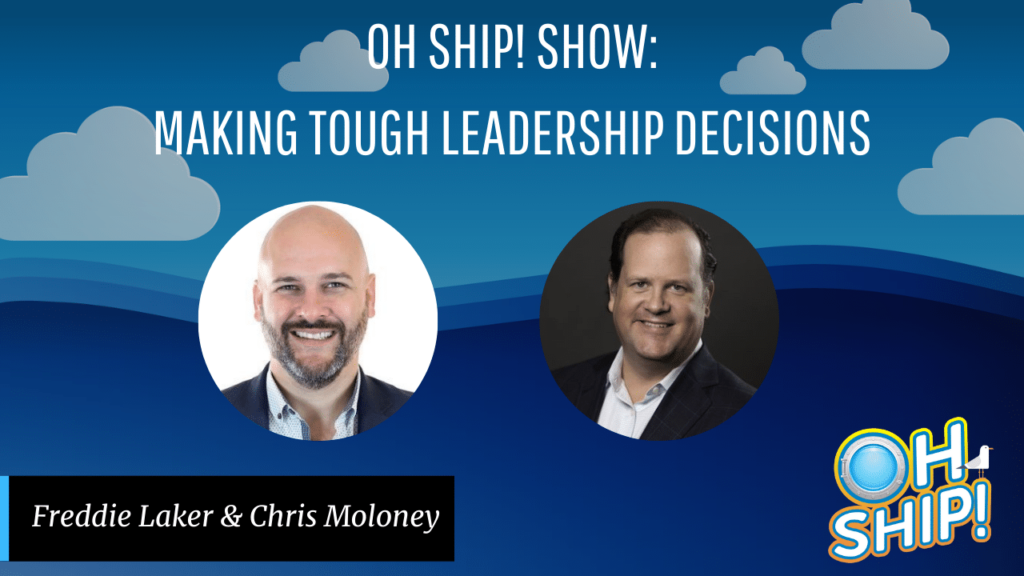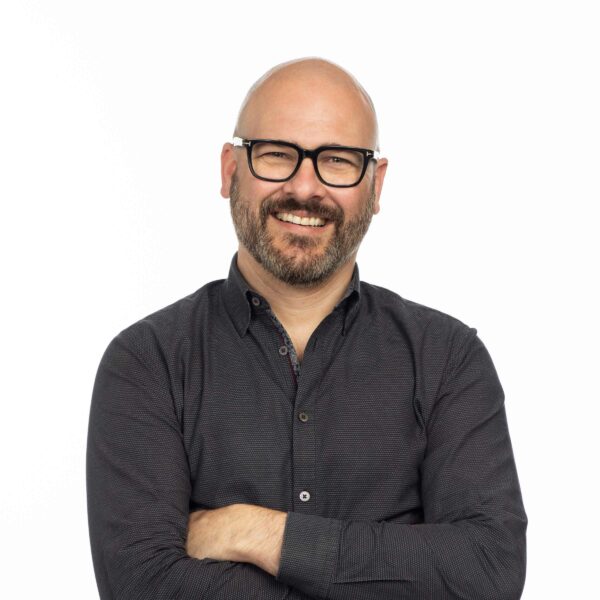Here’s how Chris overcame his toughest leadership moments—and what he learned on the way.
Chris Moloney has been CMO of both global brands and smaller businesses. He’s served as CMO and SVP of ecomm for Brinks Home Security, as well as CMO of Taxslayer, Wells Fargo Advisors, and Experian. He’s even co-president of the CMO Club! With his wealth of experience, he has fantastic advice on making tough calls for leaders at all levels.
What was his most challenging experience in a new leadership role?
Being brought in as a change agent brings a lot of pressure. The company is looking for someone to stir things up—sometimes immediately, Chris says. His biggest challenge as a change agent happened at one of the largest credit bureaus, which ran the website freecreditreport.com and had a booming D2C business. His first week there, they had a major board meeting to decide how to respond to the broader shift in focus from credit reports to credit scores. “Their biggest product, which generates hundreds and hundreds of millions of dollars—they made a decision that they wanted to switch all the customers to a different product line,” he says.
“We had to literally build new marketing and a new product in a matter of weeks,” he continues. “And I just didn’t think it was possible to shift it. So that was a super stressful one. But the fun part about it was our strategy at the time.”
The bureau already ran fun, silly TV ads all night long featuring a band. They could keep the same band to promote the new brand, he thought. But it turned out they were French Canadian—they didn’t actually speak English or sing. So, they changed course.
“We did a nationwide band search—Chicago, LA, New York, all over the country—promoted it and got local bands to audition to be the free credit score band. And it was a huge success,” Chris says. “All of the bands’ fans were voting for us.”
Plus, it delivered millions of leads because, in order to vote, people had to fill out a short lead form. “We had no idea it would generate the buzz that it did,” he says. “And it was a lot of fun.” Even though, he laughs, it felt like five years had passed instead of one.
They received the Grand Midas award—the top award in financial services marketing—for this impressive effort.
How does he approach decision-making as a leader now vs. 10 years ago?
“You had less data ten years ago,” Chris says. At the same time, he was working with companies that spent hundreds of millions on media. “This was a little bit earlier in the measurement days, so you had to have a little bit of a gut feeling about what was working,” he continues. “You know the old adage, ‘I know 50 percent of my marketing is working; I just don’t know which 50 percent?’”
“It was a lot of fun to be in charge of big, big media budgets. But I’ve also enjoyed small companies and being really scrappy,” he adds.
“The challenge I would say now is we have so much more data,” he says. “You get a flood of data, and now you’ve got to make a decision and get people aligned around what the data means.” Thus, gut thinking remains as important as ever.
How long should a leader be in a role before making a big decision?
“In a lot of roles, especially a CMO or a head of strategy or a head of product role, you are asked to make decisions quickly. You’re a change agent. And I do think there’ll be decisions you make in your first few weeks that are important,” Chris says.
But he’s been asked to make huge decisions too quickly. Being requested to decide in week one how to reallocate hundreds of millions of dollars of revenue was probably too much, he says. “I didn’t know the business well enough to make some of those decisions.”
Nor should leaders have to wait too long to dive in. “Conversely, when I worked for a really big bank, I had a leader say to me, ‘Just listen for four to six months before you really need to speak up; learn the business first.’ And that’s not good, either,” Chris asserts. “That feels like you’re being held back. You want to be able to speak up.”
What’s the happy medium? “Toward the end of that [first] 90 days, you should feel comfortable with the ability to make a big decision, but not in your first week. Your first week is just too chaotic.”
How are interim leadership roles different from traditional leadership roles?
Chris loves being able to go into a company as an interim CMO or leader of strategy to bring an outside perspective. “Organizations sometimes keep repeating their own thinking, and they’ve all grown up in the business. And when you can come in with an outside perspective, they appreciate that,” he says. “So I love the role.”
It also lends time to step back and think strategically, in contrast to a lot of CMO roles, where you have nine or ten hours of meetings per day.
“The best question you can ask is, ‘Why?’” says Chris. “You don’t even have to have the answer. You just have to have the best questions, and by asking someone, ‘Why do we do it that way? Why was this set up this way? Why is this form 32 pages long?’—you can get a lot done.”
“You get to provide two big things: You provide perspective, but you also are able to say, ‘We have to focus. We have to have a focus on these few things,” he says. “When I’ve been in certain CMO roles, you’re so scattered, you’re doing fifty things a day, that you don’t feel like you can focus. And I think as leaders, it’s really, really important to say, ‘What are my priorities?’ I’m a big believer in writing down priorities and writing down goals and sharing those goals.”
What’s the best advice he’s gotten from a boss or mentor?
As review time approached, Chris asked a newer boss what he was looking for. And his boss said something he’d never heard before: “I will judge you on your next review by the quality of the last person you hired on the team.” From that moment, Chris prioritized hiring the right people in terms of both skills and culture fit and then taking care of them.
What advice would he give new marketing professionals?
Early in his career, Chris had a revelation: “Your job is to do what your boss’s priorities are, and maybe they’re not able to always clearly state them.” You have to strive to understand them by asking questions like these: “Are we trying to grow revenue, or are we trying to grow margin? Are we trying to grow the value of the enterprise? Or are we trying to grow some other metric? What is most important to the organization?”
Chris also advises asking for a review off-season. He once gained invaluable direction through a mid-season review that he asked his boss for.
Further, be prepared to make tough decisions on people at some point in your career. “People decisions are always exceedingly difficult; you’re impacting people and their lives,” he says. “You have to have a really solid, principled framework of how you’re going to make those decisions.”
Finally, building relationships with other key departments is key. “You really need to partner closely with the CFO and make sure the CFO understands what you’re doing. When you’re doing B2B marketing, you need to be really close to sales and understand how they feel about the leads you’re generating and have that honest conversation,” Chris explains.
“Building bridges with people is key, and getting peers aligned with what you’re trying to accomplish—that’s how you make decisions.”







